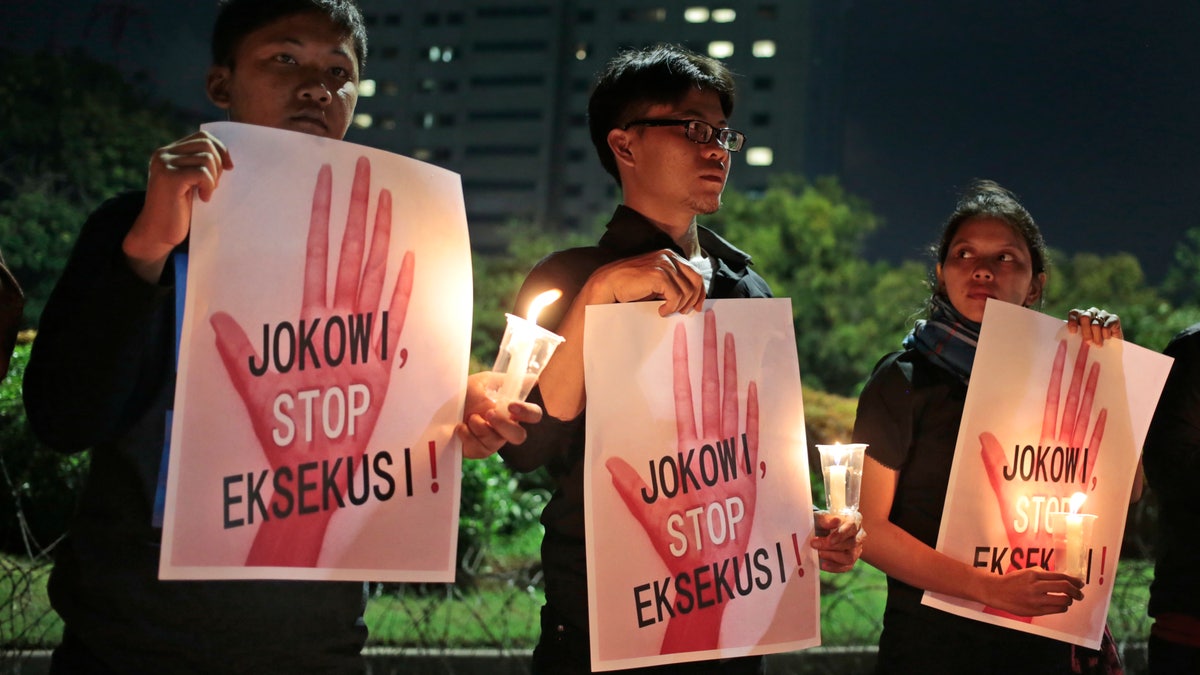
Activists hold posters which read "Jokowi, stop the executions!" during a vigil outside the presidential palace in Jakart. "Jokowi" is the popular nickname of Indonesian President Joko Widodo. (AP Photo/Dita Alangkara)
Indonesian television networks reported early Friday the government carried out a series of executions, rebuffing harsh criticism from human rights activists.
Three networks said Friday the executions occurred not long after midnight local time on the Nusa Kambangan prison island.
It was not clear how many people were put to death. The government did not make an immediate announcement. Earlier this week, Indonesia's attorney-general said 14 people, mostly foreigners, would be executed.
Officials began tightening security at the prison several days ago, with more than 1,000 police sent to Cilacap, the port town, and the island.
The European Union and the U.N. High Commissioner for Human Rights called on Indonesia to impose an immediate moratorium on executions and the Indian and Pakistani governments said they were making urgent efforts to save two nationals among the condemned.
Community Legal Aid Institute, which is involved in some of the death row cases, has given names for four Indonesians, six Nigerians, two Zimbabweans, one Indian and one Pakistani.
Lawyers and rights groups raised serious doubts about the legitimacy of the convictions in several of the drug cases, including that of Pakistani Zulfikar Ali, Indonesian Merri Utami and Nigerian Humphrey Jefferson. About 10 women protesting in Cilacap against Utami's death sentence were taken away in a police van on Thursday.
But Muhammad Rum, a spokesman for Indonesia's attorney-general, said the executions were the "implementation of our positive laws." All the cases went through a long legal process including appeals, he said.
In Cilacap, the sister-in-law of Michael Titus, a Nigerian sentenced to death, said his Indonesian wife was returning to Indonesia from West Africa in the hope she would be able to see him a final time. "We will keep fighting to seek justice for our family," said the relative, Nila, who used one name. "Michael is not alone. He has a wife, kids."
From Pakistan, a sister of Ali made an emotional appeal to the Indonesian authorities to review his case. Family members said the Indonesian government had arranged a final meeting between Ali and his wife and mother, who traveled to Indonesia.
"My brother is not a drug smuggler. I swear he is innocent," said Sajida Bibi. "I want to see my brother alive," she sobbed. "Don't send his body to us."
Justice Project Pakistan, a group that provides free legal representation, said Ali's confession following his arrest in November 2004 was obtained by police torture. It said his case has not been properly reviewed by Indonesian authorities despite an internal government investigation casting doubt on the conviction for drug trafficking.
The Indonesian government says the death penalty is necessary for drug crimes because the country is facing a drug epidemic, particularly affecting young people. But critics argue capital punishment is not an effective deterrent and some have also questioned the accuracy of the government's drug abuse statistics.
It would be the third set of executions under President Joko "Jokowi" Widodo, who campaigned on promises to improve human rights. His 2-year-old administration will have executed more people than were executed in the previous decade. Fourteen were put to death last year.
Cap. Bintoro Wasono, a Cilacap police spokesman, said two burial sites, one for Muslims and the other for Christians, have been prepared for inmates whose bodies would not be taken by their families.
U.N. High Commissioner for Human Rights Zeid Ra'ad Al Hussein said in a statement he's "deeply concerned" by death penalty cases in Indonesia that lack transparency and compliance with the right to a fair trial, including the right to an appeal.
The EU called on Indonesia to "consider joining the wide community of over 140 states that have abolished the death penalty entirely or have adopted a moratorium."
The government of Jokowi's predecessor did not carry out executions between 2009 and 2012, but resumed them in 2013.
Worldwide, China is believed to be the country with the highest number of executions but it does not release figures. Amnesty International estimates several thousand people are executed in China each year. Of the more than 1,600 publicly announced executions last year, Amnesty says nearly 90 percent of them were in three countries: Saudi Arabia, Pakistan and Iran.
The Associated Press contributed to this report.
